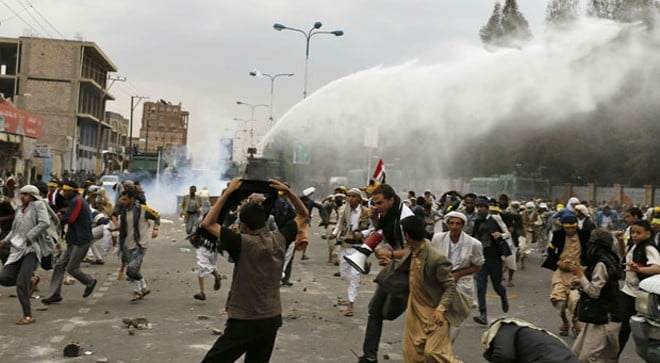
While regional game of politics plays out in Yemen, life is becoming difficult for the Yemenis

As these lines are being written, tensions continue to escalate inside Yemen as well as outside it. Iran’s sending of navy warships near the Yemen waters in the Gulf of Aden is not being seen as a good development for efforts seeking peace in Yemen or trying to stop the conflict from spreading outside it.
While there is no clear answer to what is likely to happen in Yemen in the foreseeable future, street fighting and heavy shelling in Aden, the last bastion of support for Abdu Rabu Mansour Hadi, does not seem to be ending. Death toll had reached 26 in Yemen on April 9.
There are harrowing stories of fighting between Houthi rebels and hundreds of armed tribesmen attacking buildings in Ibb. The fighting in Ibb comes as the UN warned that more than 100,000 people have fled their homes in different provinces in Yemen seeking safety from the violence.
There is weight in the argument that the uprising in Yemen and the tension in the whole region is distracting regional actors from the war against the ISIS. That should be enough cause for the regional and international players to help the warring sides come out of this crisis.
Understandably, China and Russia seem to be rightly concerned. "We call on all relevant parties to quickly implement a ceasefire and avoid further civilian casualties," says a Chinese foreign ministry official.
Yemen has witnessed conflict and chaos since Houthi rebels, who complain of being marginalised in the majority Sunni country, forced Abdu Rabu Mansour Hadi from power. The Houthis were able to put Hadi under house arrest when they attacked Sana’a in January. But Hadi escaped in February. He fled to Aden. Houthis and their allies, including those loyal to Saleh, Hadi’s predecessor, fought Hadi’s forces in the Aden area. Hadi was successful in fleeing from Aden in March. He is believed to have gone underground, most probably in Saudi Arabia.
The conflict inside Yemen was not overlooked by Saudi Arabia, a predominately Sunni population and Yemen’s neighbour to the north. The Kingdom sees the ousting of Hadi as overrunning of a legitimate government.
The Houthis are seen as an ally of Iran, Saudi Arabia’s rival in the Persian Gulf region. The later sees Houthis as threat to its sovereignty, a claim which experts of international relations do not see as being sound.
While the conflict continues to spin out of control, aid workers have warned of a humanitarian crisis, saying at least 560 people, including children, have been killed in airstrikes and armed clashes. World Health Organization estimates that more than 1,700 people have been wounded and another 100,000 have fled their homes as fighting intensified. According to UNICEF, at least 74 children have also been killed since the fighting began.
According to Yemen officials, airstrikes have destroyed much of the infrastructure and the areas held by Houthis are plunged into darkness. Many fear they will lose access to clean water as well.
The fighting in Yemen may cause widespread hunger and thirst besides displacing a huge numbers of people that will create another humanitarian disaster, according to aid workers. With a population of about 25 million people, Yemen was struggling with alarming malnutrition levels even before the offensive by a coalition led by Saudi Arabia. The coalition’s airstrikes as well as fighting at the country’s airports and seaports have blocked access to food and other supplies.
According to the United Nations, major urban centres, including Aden, which has a population of about 1 million, may run out of drinking water. The fighting has displaced thousands of Yemenis and if the unrest continues it can produce hundreds and thousands of refugees, analysts say.